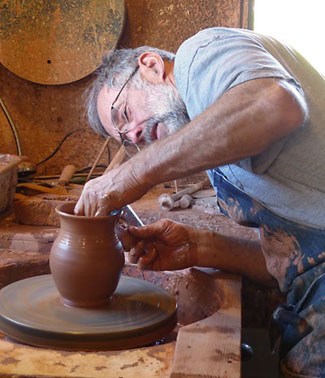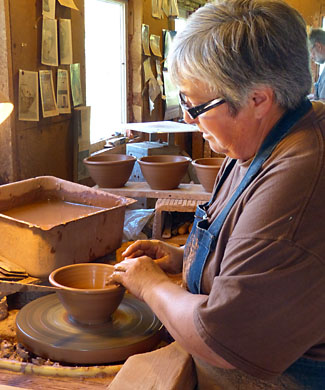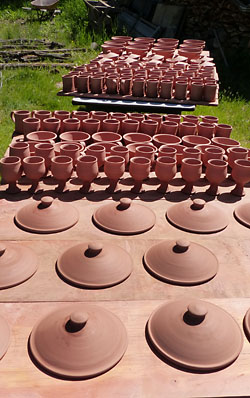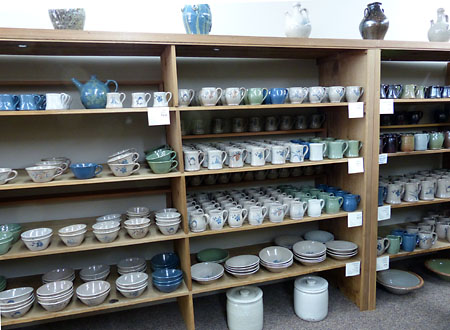home | internet service | web design | business directory | bulletin board | advertise | events calendar | contact | weather | cams

|
 John Almquist makes the curve on a vase. John Almquist makes the curve on a vase.After 40 years in the business, local Methow Valley potters John and Agnes Almquist are planning to close down their Winthrop main street storefront late this year and ease back. “The physical part (of the business) is taking its toll,” said Agnes. John started learning to throw pots in college. He attended both Tacoma Community College and Central Washington State College. Agnes was introduced to pottery in high school at the Waldorf School in Wilton, New Hampshire, by a pottery teacher who is still at the school and teaching at 89 years old, Agnes said. Agnes loved throwing pots so she apprenticed in the famous Jugtown Pottery in North Carolina. Jugtown Pottery put its first stamp on a pot in 1922, according to its website, and was listed in the National Register of Historic Places in 1999. John and Agnes’ story together starts at Jugtown. “We were thrown together in the apprentice cabin, we being the two apprentices at the time,” Agnes explained. “I had arrived with my boyfriend, who headed back up to New Hampshire. John and I just kind of got together, and somehow we have managed to stay together and work together for almost 40 years.” “Jugtown is in an area where—when we were there—the people that grew up there still used some old English pronunciations. When the guys would get together and talk, we could hardly figure out what they were saying,” she remembered. ‘Fought’ sounded like ‘fowt’, braids were plaits, but they were all the nicest people.”  Agnes Almquist turns clay mud into a bowl. Agnes Almquist turns clay mud into a bowl.“It wasn't long before we were making their smaller shapes and we became part of the production team.” The Almquists moved to the valley and started their business in Winthrop in 1974 because they thought “it would be a beautiful place to live and sell pottery,” John said. John’s brother Frank and Frank’s wife Donna were involved for a time: they kept Almquist Pottery going in Winthrop for two years while John and Agnes returned for another round at Jugtown Pottery. “We went back when they needed help, and we also felt like it would be a good thing to get more experience. Our daughter Sara was two and a half when we headed back. She soon became everyone’s darling. By the time we left she had a right smart deepest, darkest corner of Moore county accent,” Agnes recalled. Over time, she said, “our skills have gotten better,” but in the humble tradition of Jugtown, “we’ve never wanted to be too complicated . . . we wanted to price it so locals can buy.” Asked how many pieces of pottery they’ve sold over the years, they discussed it some, then laughed and gave up on trying to estimate. Once John did the figures and found that they had turned about 12 tons of clay—that’s tons of dry clay, not wet clay—in one year. The Almquists said they haven’t made pots from any local clay: their clay is coming now from the Sacramento area, premixed so that it won’t be so taxing to prepare for the pottery wheel.  Fresh Almquist bowls, mugs, cups and pot lids dry in the sun outside their studio. Fresh Almquist bowls, mugs, cups and pot lids dry in the sun outside their studio.After the Mt. St. Helens eruption, they sometimes traveled to Ritzville to gather volcanic ash and bring it home in five-gallon buckets to use for their glazes. They added oxides—iron, cobalt, tin, copper, etc.—to make different colors. The Almquists don’t waste much. What is now their home on Castle Avenue in Winthrop first served as an apple, then potato, storage shed. They took the well-insulted building and converted it into a pleasant, comfortable home for themselves and their two now-grown children, Sara Crum and Owen Almquist, who both still live in the valley. Their first Almquist Pottery workshop was built of logs they hauled off the old Boulder Creek burn. Their first Winthrop home, immediately adjacent to where they now reside, was an old apple picker’s shack, which they renovated. It was moved down from the Duffy Orchard on the next bench above on the shoulder of Stud Horse Mountain. The Almquists have both electric and wood-fired kilns. They built the wood-fired kiln themselves from fire bricks salvaged when the Twisp lumber mill was torn down. Most of the pottery for sale in their shop can serve a function in a home, but they do bust out into broader artistic expression some times: that’s a tradition from Jugtown, John explained, where “at the end of the day (a production potter) might make a chicken or a ‘face jug’--a grotesque human face. Early Jugtown folk art sells for high prices now, he added. Time and prices do change. Their pie plates sold for $5 in the beginning, according to Agnes. But a trip to the shop this summer found pie plates for $25.75. As the business got bigger, they hired help. “We’ve had wonderful people working for us,” helping to watch the shop in town and watch the kids while they threw pots, Agnes said. Reva Reed has been tending the store this summer. “Mary Ann Bame also worked for us, and Pat Sigler still works some as well,” said Agnes. So does Debbie Asia.  The Almquist’s shop in Winthrop holds shelves of hand-made and individually decorated production pottery. The store will be closing late this year. The Almquist’s shop in Winthrop holds shelves of hand-made and individually decorated production pottery. The store will be closing late this year.Reed said that the Almquists “are an inspiration to me.” She said that they give generously to good causes in the community and outside the valley in places like Tonasket and Entiat, but that they would never point that out to anyone. Making pottery “is a lot of work,” but “our lives have been so consistent,” explained John, a fact that they clearly enjoy. And after the downtown shop closes “we’re still going to get up and go out there and make pottery.” “There are a lot of things we could say, like how lucky we have been to work together all these years doing what we love. To have had great employees, to have raised our kids here and lived in such an incredible place, and to have had so many great customers and friends who have supported us all these years. We could never have made it without them,” Agnes concluded. “We will still be making and selling pottery in some way, we are just closing the shop and simplifying our lives.” 8/2/2013 Comments
|
